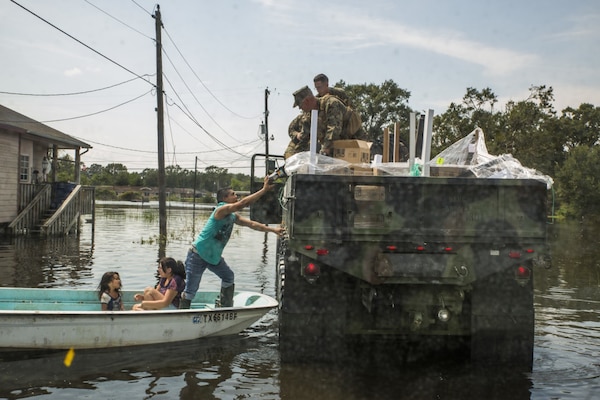By Marine Corps Pfc. Samantha Schwoch U.S. Marine Corps
Forces Reserve
HEMPSTEAD, Texas, Sept. 4, 2017 — Marines with 4th
Reconnaissance Battalion, 4th Assault Amphibian Battalion and 14th Marine
Regiment, 4th Marine Division, Marine Forces Reserve, have come together since
Aug. 28 in the wake of Hurricane Harvey to conduct search and rescue missions
and provide disaster relief to affected areas of Texas and Louisiana.
Hurricane Harvey, a storm of record-breaking proportions,
dropped an estimated 27 trillion gallons of water or 51 inches of rain in the
two states. Marines supported lead federal agencies and worked closely with
state and local officials to conduct search and rescue missions. As flood
waters rose, the Marines' amphibious capabilities, which make them unique among
the services, allowed them to swiftly rescue residents in distress.
The U.S. Marine Corps Reserve is exceptional in its ability
to respond quickly to any call and to flexibly conduct operations through air,
logistics and ground elements. For example, the Marines rapidly mobilized and
used their amphibious assault vehicles designed to transport Marines from ship
to shore to rescue residents from flood affected areas.
Humanitarian Assistance
"We were called up to come out and provide humanitarian
assistance to the local population," said Marine Corps Gunnery Sgt. Alan
Daigle, a platoon sergeant with 4th Assault Amphibian Battalion, 4th Marine
Division, Marine Forces Reserve. "We got the call to come over to east
Texas into [the] Beaumont, Lumberton and Port Arthur areas. So we've been doing
humanitarian missions, going out with the swift-water rescue survival team and
finding areas that traditional military vehicles cannot get in and out of. The
amphibious assault vehicles help us get to those areas."
Marines from 4th Reconnaissance Battalion, 4th Assault
Amphibian Battalion and Marine Light Attack Helicopter Squadron 773 rescued
almost 1,300 residents and countless animals from the affected areas.
"We got our first mission to Clearview, Texas, to help
the local authorities there to go to these neighborhoods that were
unreached," said Marine Corps Sgt. Brad L. Coats, a reconnaissance Marine
with 4th Reconnaissance Battalion, 4th Marine Division, Marine Forces Reserve.
"They had us going house to house via Zodiac, which is our combat rubber
rafts, checking on the individuals that were in these houses to see if they
wanted to be rescued or if they needed supplies."
Lifesaving Efforts
The units from Marine Forces Reserve focused on lifesaving
efforts throughout south east Texas, where many of the Marines are from.
Charlie Company, 4th Assault Amphibian Battalion is located in Galveston, and
4th Reconnaissance Battalion is based in San Antonio. The Texas-based Marines
have long-standing relationships in the surrounding communities where they live
and work.
"We have a personal responsibility to pull together
because it's like our home is being invaded in a way," said Marine Corps
Staff Sgt. Travis Hough, a reconnaissance Marine with 4th Reconnaissance
Battalion, 4th Marine Division, Marine Corps Forces Reserve. "Since all of
us are from San Antonio and the surrounding areas, essentially it's more than
just a duty but more of a personal responsibility to help out our fellow
communities. It's the best part about having that special bond together,
especially in Texas."








